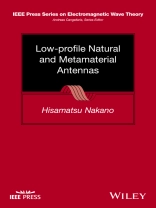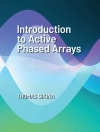Presents recent progress in low-profile natural and metamaterial antennas
This book presents the full range of low-profile antennas that use novel elements and take advantage of new concepts in antenna implementation, including metamaterials. Typically formed by constructing lattices of simple elements, metamaterials possess electromagnetic properties not found in naturally occurring materials, and show great promise in a number of low-profile antenna implementations. Introductory chapters define various natural and metamaterial-based antennas and provide the fundamentals of writing computer programs based on the method of moments (Mo M) and the finite-difference time-domain method (FDTDM). Chapters then discuss low-profile natural antennas classified into base station antennas, mobile card antennas, beam-forming antennas, and satellite-satellite and earth-satellite communications antennas. Final chapters look at various properties of low-profile metamaterial-based antennas, revealing the strengths and limitations of the metamaterial-based straight line antenna (metaline antenna), metamaterial-based loop antenna (metaloop), open metaloop antenna, the effects of counter dual-band CP radiation, and more.
- Offers comprehensive coverage of both metamaterials and natural materials for low-profile antennas
- Written by an internationally-recognized expert in the field of low-profile antennas
- Depicts actual high-performance low-profile antennas for the antenna engineer
- Draws on classroom-tested material in graduate courses and short courses over the past 20 years
Low-Profile Natural and Metamaterial Antennas is a must-have reference book for advanced undergraduate and graduate level students as well as antenna engineers interested in low-profile antenna design theory.
Inhaltsverzeichnis
Preface xi
Acknowledgments xv
Part I Introduction 1
1. Categorization of Natural Materials and Metamaterials 3
1.1 Natural and Metamaterial Antennas Discussed in This Book 3
1.2 Some Antenna Examples 6
References 8
2. Integral Equations and Method of Moments 11
2.1 Basic Antenna Characteristics 11
2.2 Integral Equation on a Straight-Wire Antenna 15
2.3 Method of Moments 16
2.4 Integral Equation for an Arbitrarily Shaped Wire Antenna in Free Space 19
2.5 Point-Matching Technique 22
2.6 Integral Equation N1 for an Arbitrarily Shaped Wire Antenna: Closed Kernel Expression 23
2.7 Integral Equations N2 and N3 for an Antenna System Composed of an Arbitrarily Shaped Wire and an Arbitrarily Shaped Aperture and Their Mo M Transformation 27
2.8 Integral Equation N4 for an Arbitrarily Shaped Wire Antenna on a Dielectric Substrate Backed by a Conducting Plane and Its Mo M Transformation 34
2.9 Integral Equation N5 for an Arbitrarily Shaped Wire Antenna on a Dielectric Half-Space and Its Transformation Using a Finite-Difference Technique 41
References 46
3. Finite-Difference Time-Domain Methods (FDTDMs) 49
3.1 Basis 49
3.2 LOD–FDTD Method 52
References 57
Part II Low-Profile Natural Antennas 59
Part II-1 Base Station Antennas 61
4. Inverted-F Antennas 63
4.1 Inverted-F Antenna with a Single Parasitic Inverted-L Element 63
4.2 Inverted-F Antenna with a Pair of Parasitic Inverted-L Elements 67
References 73
5. Multiloop Antennas 75
5.1 Discrete Multiloop (ML) Antennas 75
5.2 Modified Multiloop Antennas 78
5.3 Plate-Loop (PL) Antenna 82
References 83
6. Fan-Shaped Antenna 85
6.1 Wideband Input Impedance 85
6.2 Characteristics of The Fan-Shaped Antenna 86
6.3 Cross Fan-Shaped Antenna (X-Fan Antenna) 87
6.4 Cross Fan-Shaped Antenna Surrounded By a Wire (X-Fan-W) 89
6.5 Cross Fan-Shaped Antenna with Slots (X-Fan-S) 92
References 93
7. BOR–SPR Antenna 95
7.1 Configuration 95
7.2 Antenna Input Characteristics of Initial Patch, Patch-Slot, and PSP Antennas 97
7.3 Replacement of The Patch Island with a Conducting Body of Revolution (BOR) 99
References 103
Part II-2 Card Antennas for Mobile Equipment 105
8. Inverted LFL Antenna for Dual-Band Operation 107
8.1 Configuration 107
8.2 Design 107
References 114
9. Fan-Shaped Card Antenna 117
9.1 Configuration 117
9.2 Antenna Characteristics 118
References 123
10. Planar Monopole Card Antenna 125
10.1 Ant-1 and Ant-2 125
10.2 Ant-3 and Ant-4 127
References 131
Part II-3 Beam forming Antennas 133
11. Inverted-F Antenna Above an Electromagnetic Band-Gap Reflector 135
11.1 Inverted-F Array with an EBG Reflector (EBG-Inv F Array) 135
11.2 Antenna Characteristics 136
References 140
12. Reconfigurable Bent Two-Leaf and Four-Leaf Antennas 143
12.1 Be To L Antenna 143
12.2 Be Fo L Antenna 153
References 160
13. Patch Antenna with a Nonuniform Loop Plate 163
13.1 Antenna System 163
13.2 Reference Gain and Broadside Radiation—Placement of a Homogeneneous Perio AEs Plate 166
13.3 Gradation Constant and Tilted Radiation Beam—Placement of a Nonhomogeneous Perio AEs Plate 168
13.4 Gain 170
References 173
14. Linearly Polarized Rhombic Grid Array Antenna 175
14.1 Configuration 175
14.2 Radiation Pattern and Gain 177
14.3 VSWR Characteristic 183
References 183
15. Circularly Polarized Grid Array Antenna 185
15.1 Configuration of a Prototype Loop-Based CP GAAEDG 185
15.2 Radiation Characteristics of The Prototype Loop-Based CP GAAEDG 188
15.3 Configuration of an Advanced Loop-Based CP GAAEDG 191
15.4 Radiation Characteristics of The Advanced Loop-Based CP GAAEDG 192
References 198
Part II-4 Earth–Satellite and Satellite–Satellite Communications Antennas 199
16. Monofilar Spiral Antenna Array 201
16.1 Tilted-Beam Monofilar Spiral Antenna 201
16.2 Tilted CP Fan Beam 206
References 209
17. Low-Profile Helical Antenna Array 211
17.1 Array Element 211
17.2 Array Antenna 213
17.3 Application Examples 219
References 221
18. Curl Antennas 223
18.1 High-Gain Normal-Beam Array Antenna Composed of Internal-Excitation Curl Elements 223
18.2 High-Gain Tilted-Beam Array Antenna Composed of External-Excitation Curl Elements 229
References 236
Part III Low-Profile Metamaterial Antennas 237
19. Metaline Antenna 239
19.1 Unit Cell 239
19.2 Natural Characteristic Impedance ZNTR, Bloch Impedance ZB, and Phase Constant β 240
19.3 Two-Metaline Antennas 243
References 246
20. Metaloop Antenna for Linearly Polarized Radiation 247
20.1 Metaloop Configuration 247
20.2 Single- and Dual-Peak Beams 249
References 253
21. Circularly Polarized Metaloop Antenna 255
21.1 Configuration 255
21.2 Counter-CP Radiation 255
References 260
22. Metaspiral Antenna 261
22.1 Circularly Polarized Radiation 261
22.2 Linearly Polarized Radiation 266
References 271
23. Metahelical Antennas 273
23.1 Round Metahelical Antenna 273
23.2 Rectangular Metahelical Antenna 276
References 282
Index 283
Über den Autor
Hisamatsu Nakano is Professor in the Department of Electrical and Electronics, Science and Engineering at Hosei University, Tokyo, Japan. Professor Nakano received the 2010 Prize for Science and Technology from Japan’s Minister of Education, Culture, Sports, Science, and Technology, and is the holder of 78 patents, author of over 300 papers, and a Life Fellow of the IEEE.












